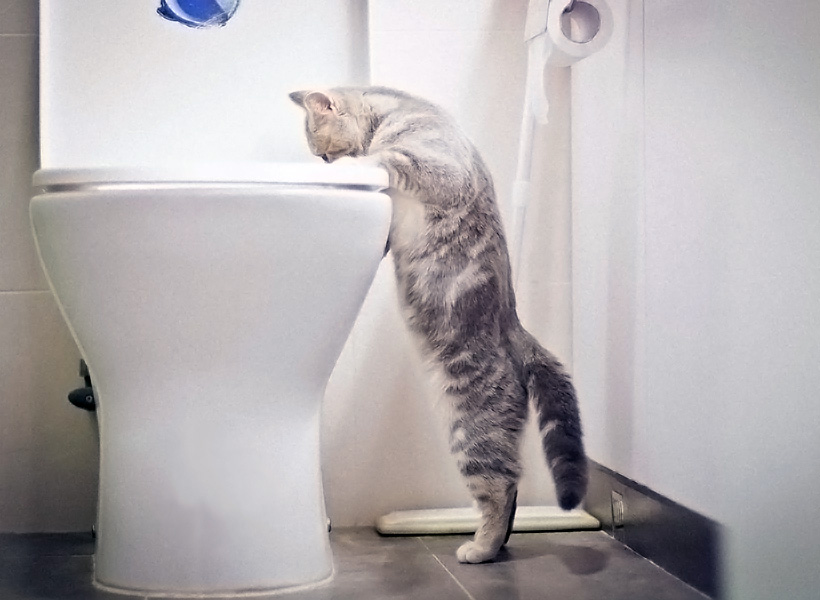Why You Mustn't Flush Cat Poop Down Your Toilet - Maintain Your Pipe Health
Why You Mustn't Flush Cat Poop Down Your Toilet - Maintain Your Pipe Health
Blog Article
The article below in relation to Can You Flush Cat Poo or Litter Down the Toilet? is pretty much compelling. You should take a look.

Introduction
As feline owners, it's vital to be mindful of just how we throw away our feline buddies' waste. While it might seem practical to purge cat poop down the commode, this practice can have damaging effects for both the environment and human health and wellness.
Ecological Impact
Flushing feline poop presents harmful pathogens and parasites right into the supply of water, presenting a considerable risk to marine communities. These contaminants can adversely influence aquatic life and concession water high quality.
Health Risks
In addition to environmental concerns, purging pet cat waste can additionally posture wellness dangers to people. Cat feces may contain Toxoplasma gondii, a bloodsucker that can trigger toxoplasmosis-- a potentially severe ailment, especially for expecting women and people with weakened body immune systems.
Alternatives to Flushing
The good news is, there are much safer and more liable ways to dispose of pet cat poop. Consider the adhering to alternatives:
1. Scoop and Dispose in Trash
One of the most usual technique of dealing with feline poop is to scoop it right into a biodegradable bag and throw it in the garbage. Be sure to make use of a dedicated litter scoop and take care of the waste promptly.
2. Use Biodegradable Litter
Select eco-friendly pet cat clutter made from products such as corn or wheat. These clutters are eco-friendly and can be securely dealt with in the trash.
3. Bury in the Yard
If you have a backyard, take into consideration hiding feline waste in an assigned area away from veggie yards and water resources. Be sure to dig deep enough to stop contamination of groundwater.
4. Set Up a Pet Waste Disposal System
Purchase a family pet waste disposal system specifically created for feline waste. These systems make use of enzymes to break down the waste, reducing odor and environmental impact.
Conclusion
Liable animal ownership prolongs beyond providing food and sanctuary-- it additionally involves appropriate waste administration. By avoiding purging feline poop down the toilet and selecting alternative disposal techniques, we can decrease our environmental footprint and secure human wellness.
Why You Should Never Flush Cat Poop Down the Toilet
A rose by any other name might smell as sweet, but not all poop is created equal. Toilets, and our sewage systems, are designed for human excrement, not animal waste. It might seem like it couldn’t hurt to toss cat feces into the loo, but it’s not a good idea to flush cat poop in the toilet.
First and foremost, assuming your cat uses a litter box, any waste is going to have litter on it. And even the smallest amount of litter can wreak havoc on plumbing.
Over time, small amounts build up, filling up your septic system. Most litter sold today is clumping; it is made from a type of clay that hardens when it gets wet. Ever tried to scrape old clumps from the bottom of a litter box? You know just how cement-hard it can get!
Now imagine just a small clump of that stuck in your pipes. A simple de-clogger like Drano isn’t going to cut it. And that means it’s going to cost you big time to fix it.
Parasitic Contamination
Believe it or not, your healthy kitty may be harboring a nasty parasite. Only cats excrete Toxoplasma in their feces. Yet it rarely causes serious health issues in the cats that are infected. Most people will be fine too if infected. Only pregnant women and people with compromised immune systems are at risk. (If you’ve ever heard how women who are expecting are excused from litter cleaning duty, Toxoplasma is why.)
But other animals may have a problem if infected with the parasite. And human water treatment systems aren’t designed to handle it. As a result, the systems don’t remove the parasite before discharging wastewater into local waterways. Fish, shellfish, and other marine life — otters in particular — are susceptible to toxoplasma. If exposed, most will end up with brain damage and many will die.
Depending on the species of fish, they may end up on someone’s fish hook and, ultimately on someone’s dinner plate. If that someone has a chronic illness, they’re at risk.
Skip the Toilet Training
We know there are folks out there who like to toilet train their cats. And we give them props, it takes a lot of work. But thanks to the toxoplasma, it’s not a good idea.

Do you enjoy reading about How to Dispose of Cat Poop and Litter Without Plastic Bags? Post feedback down below. We will be pleased to know your insights about this page. We hope that you visit us again before long. Sharing is nice. You won't know, you may very well be helping someone out. Bless you for your time. Visit again soon.
Call Today Report this page